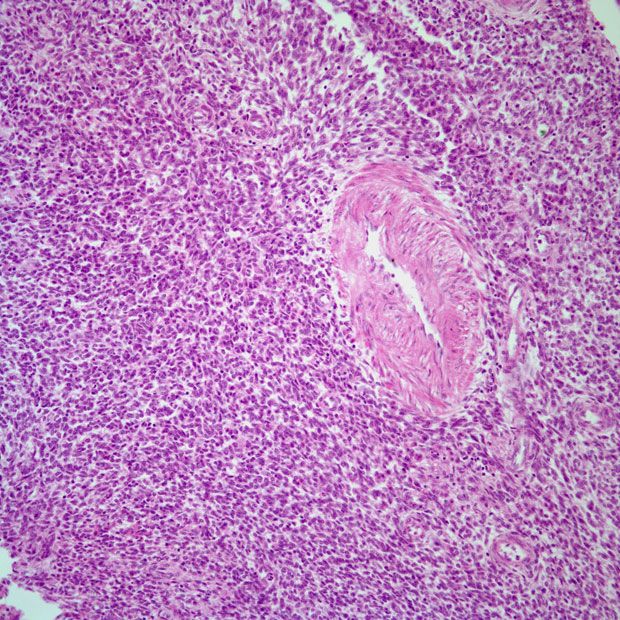Dostarlimab Earns Priority Review From FDA In Advanced Endometrial Cancer
The FDA accepts a supplemental biologics license application for dostarlimab plus chemotherapy in the treatment of mismatch repair deficient/microsatellite instability-high advanced or recurrent endometrial cancer based on data from a prespecified interim analysis of the phase 3 RUBY/ENGOT-EN6/GOG3031/NSGO trial.
The global, double-blind, multicenter RUBY trial included 494 patients who were randomly assigned to either the dostarlimab (n = 245) or the placebo arms (n = 249).

The FDA has granted priority review to a supplemental biologics license application (sBLA) for dostarlimab-gxly (Jemperli) when used in combination with chemotherapy for the treatment of mismatch repair deficient (dMMR)/microsatellite instability–high (MSI-H) advanced or recurrent endometrial cancer, according to a press release from GSK plc.1
According to the announcement, the FDA has assigned dostarlimab a Prescription Drug User Fee Act action date of September 23, 2023. The immune checkpoint inhibitor has also previously obtained a breakthrough therapy designation for this indication.
“We are excited about this initial filing for this potential new indication for dostarlimab in the patient population that demonstrated the strongest treatment effect in the phase 3 RUBY trial,” Hesham Abdullah, senior vice president and global head of Oncology Development at GSK, said in the press release.
This decision comes as a result of findings from a prespecified interim analysis of the phase 3 RUBY/ENGOT-EN6/GOG3031/NSGO trial (NCT03981796), the findings of which were presented at The Society of Gynecologic Oncology (SGO) 2023 Annual Meeting on Women’s Cancer and simultaneously published in The New England Journal of Medicine.2,3 The trial met its primary end point of investigator-assessed progression-free survival (PFS), demonstrating a 24-month PFS rate of 36.1% (95% CI, 29.3%-42.9%) with dostarlimab vs 18.1% (95% CI, 13.0%-23.9%) with placebo at 24 months in the overall population (Hazard ratio [HR], 0.64; 95% CI, 0.51-0.80, P <.001).
Additionally, the estimated PFS rate at 24 months in the dMMR/MSI-H population was 61.4% (95% CI, 46.3%-73.4%) with dostarlimab vs 15.7% (95% CI, 7.2%-27.0%) with placebo (HR 0.28; 95% CI, 0.16-0.50; P <.001).
“Substantial unprecedented benefit in patients [who were[ dMMR and clinically meaningful long-term benefit observed in the patients [who were mismatch repair proficient] along with the safety profile of the [combination] was manageable and generally consistent with that of the individual drugs,” lead study author Mansoor Raza Mirza, MD, said in the presentation. “[Therefore], dostarlimab plus carboplatin/paclitaxel represents a new standard of care for patients with primary advanced and recurrent endometrial cancer.”
Mirza is the chief oncologist in the Department of Oncology at Rigshospitalet, a part of Copenhagen University Hospital in Denmark. He also serves as vice-chairman of the Danish Society of Gynecologic Oncology.
An assessment of dostarlimab/chemotherapy outcomes in advanced/recurrent endometrial cancer by blinded independent central review (BICR) presented at the 2023 American Society of Clinical Oncology (ASCO) Annual Meeting was consistent with investigator-assessed outcomes.4 The PFS rate at 24 months was 66.3% (95% CI, 50.8%-77.9%) vs 26.0% (95% CI, 13.5%-40.5%) in the dMMR/MSI-H population with dostarlimab and placebo, respectively. The corresponding figures in the overall population were 42.5% (95% CI, 35.2%-49.6%) vs 25.4% (95% CI, 18.9%-32.4%), respectively.
The global, double-blind, multicenter RUBY trial included 494 patients who were randomly assigned to either the dostarlimab (n = 245) or the placebo arms (n = 249).
In the experimental arm, patients received dostarlimab at a dose of 500 mg, paclitaxel at a dose of 175 mg/m2, and carboplatin at a dose of the area under the curve (AUC) of 5 mg/mL/minute every 3 weeks for a total of 6 treatment cycles. They then received dostarlimab maintenance therapy at a dose of 1000 mg every 6 weeks for up to 3 years. The same regimen with a matched placebo instead of dostarlimab was administered to patients in the control arm.
The primary end points were investigator-assessed PFS and overall survival. Secondary end points included BICR-assessed PFS, overall response rate, duration of response, and disease control rate.
The FDA approved dostarlimab as a monotherapy in February 2023 for the treatment of patients with dMMR advanced or recurrent endometrial cancer.5 Moreover,the European Medicines Agency granted Type II Variation validation to the agent in April 2023 for dMMR/MSI-H advanced or recurrent endometrial cancer.6
References
- GSK receives US FDA file acceptance for Jemperli (dostarlimab) plus chemotherapy for the treatment of dMMR/MSI-H primary advanced or recurrent endometrial cancer. News Release. GSK plc. June 6, 2023. Accessed June 6, 2023. https://bit.ly/43n9wBZ
- Mirza MR, Chase DM, Slomovitz BM, et al. Dostarlimab for primary advanced or recurrent endometrial cancer. N Engl J Med. Published online March 27, 2023. doi:10.1056/NEJMoa2216334
- Mirza M, Chase D, Slomovitz, et al. Dostarlimab in combination with chemotherapy for the treatment of primary advanced or recurrent endometrial cancer: a placebo-controlled randomized phase 3 trial (ENGOT-EN6-NSGO/GOG-3031/RUBY). Presented at: 2023 SGO Annual Meeting on Women’s Cancer; March 25-28, 2023; Tampa, Florida.
- Powell MA, Hietanen S, Coleman RL, et al. Dostarlimab for primary advanced or recurrent (A/R) endometrial cancer (EC): outcomes by blinded independent central review (BICR) of the RUBY trial (ENGOT-EN6-NSGO/GOG-3031/RUBY). J Clin Oncol. 2023;41(suppl 16):5503. doi:10.1200/JCO.2023.41.16_suppl.5503
- European Medicines Agency validates marketing authorisation application for Jemperli (dostarlimab) plus chemotherapy for the treatment of dMMR/MSI-H primary advanced or recurrent endometrial cancer. News release. GSK plc. April 25, 2023. Accessed June 6, 2023. https://bit.ly/3Hb4hvO
- FDA grants regular approval to dostarlimab-gxly for dMMR endometrial cancer. News release. FDA. February 9, 2023. Accessed June 6, 2023. http://bit.ly/3xbGuH2